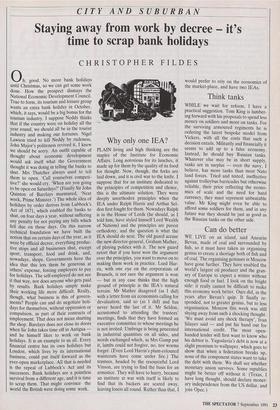Why only one TEA?
PLAIN living and high thinking are the staples of the Institute for Economic Affairs. Long notorious for its lunches, it made up for them by the quality of its food for thought. Now, though, the forks are laid down, and it is civil war to the knife. I suppose that for an institute dedicated to the principles of competition and choice, this is the ultimate solution. They were deeply unorthodox principles when the IEA under Ralph Harris and Arthur Sel- don first fought for them. Nowadays Ralph is in the House of Lords (he should, as I told him, have styled himself Lord Wealth of Nations) and the principles are purest orthodoxy, and the question is what the TEA should do next. The old guard accuse the new director-general, Graham Mather, of playing politics with it. The new guard retort that if you have won the argument over the principles, you want to move on to making them work in practice. Lard Har- ris, with one eye on the corporatists of Brussels, is not sure the argument is won — but in any case thinks that the high ground of principle is the IEA's natural terrain. Mr Mather disagreed (as I did) with a letter from six economists calling for devaluation, said so (as I did) and has never heard the last of it. Mr Seldon, accustomed to attending the trustees' meetings, finds that they have formed an executive committee to whose meetings he is not invited. Umbrage is being generated in industrial quantities on all sides, and words exchanged which, as Mrs Gamp put it, lambs could not forgive, no, nor worms forget. (Even Lord Harris's plum-coloured waistcoats have come under fire.) The trustees, headed by the resourceful Lord Vinson, are trying to find the basis for an armistice. They will have to hurry, because an institute at war with itself is likely to find that its backers are scared away, leaving losers all round. Rather than that, I would prefer to rely on the economics of the market-place, and have two IEAs.


















































 Previous page
Previous page